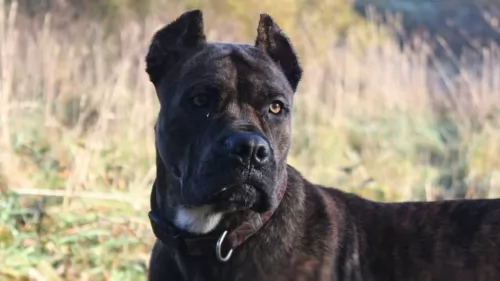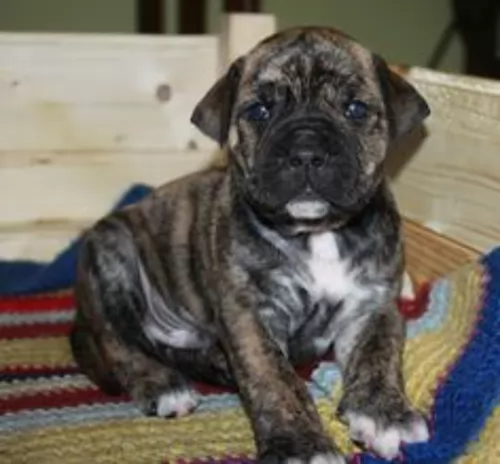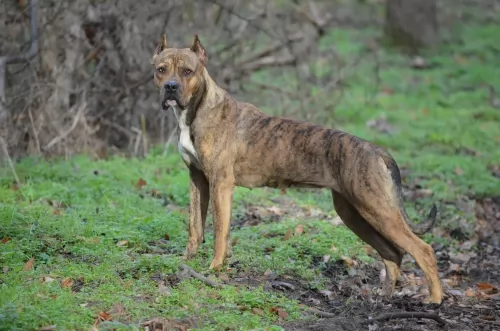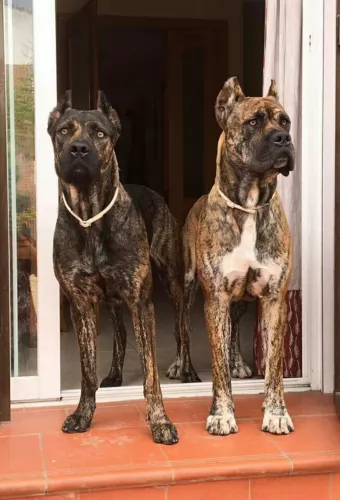 Petzlover
Petzlover Alano Espanol is originated from Spain but Norwegian Lundehund is originated from Norway. Alano Espanol may grow 24 cm / 10 inches higher than Norwegian Lundehund. Alano Espanol may weigh 31 kg / 69 pounds more than Norwegian Lundehund. Both Alano Espanol and Norwegian Lundehund has same life span. Both Alano Espanol and Norwegian Lundehund has same litter size. Alano Espanol requires Low Maintenance. But Norwegian Lundehund requires Moderate Maintenance
Alano Espanol is originated from Spain but Norwegian Lundehund is originated from Norway. Alano Espanol may grow 24 cm / 10 inches higher than Norwegian Lundehund. Alano Espanol may weigh 31 kg / 69 pounds more than Norwegian Lundehund. Both Alano Espanol and Norwegian Lundehund has same life span. Both Alano Espanol and Norwegian Lundehund has same litter size. Alano Espanol requires Low Maintenance. But Norwegian Lundehund requires Moderate Maintenance
 Alano Espanol is a very old breed and first data originate back in the 5th century. Alano has been used as dogs for war and dogs that traveled with explorers. After some, time Alano Espanol becoming more and more popular for bullfights and wild boar hunting. Nowadays, Alano Espanol is still not recognized worldwide, but it seems like this breed is getting more and more popular. They are excellent hunters and amazing working dogs.
Alano Espanol is a very old breed and first data originate back in the 5th century. Alano has been used as dogs for war and dogs that traveled with explorers. After some, time Alano Espanol becoming more and more popular for bullfights and wild boar hunting. Nowadays, Alano Espanol is still not recognized worldwide, but it seems like this breed is getting more and more popular. They are excellent hunters and amazing working dogs.
 The Norwegian Lundehund hails from the island of Vaeroy, Norway and was created for the purpose of puffin hunting.
The Norwegian Lundehund hails from the island of Vaeroy, Norway and was created for the purpose of puffin hunting.
Now that these puffins are a protected species, the dog is no longer used for hunting and has become a companion dog.
The breed decreased in numbers during- and after World War II because the islands where he came from had an outbreak of distemper. It was in 1963 that another outbreak occurred and the dogs were almost wiped out. A breeding program saw their numbers being built up.
It was in 2011 that the dog was recognized by the American Kennel Club.
 On average, Alano Espanol approximately weights 34-40kg, while their average height is 56-64cm. Females are slightly smaller than male dogs.
On average, Alano Espanol approximately weights 34-40kg, while their average height is 56-64cm. Females are slightly smaller than male dogs.
A lifespan of Alano Espanol variates but on average it is 11 to 14 years.
Litter Size is 4-8 puppies, but it depends on every dog.
Other Names for Alano Espanol are Spanish Bulldog and Spanish Alano.
 As a spitz-type dog, with the Lundehund you’ll recognize the typical spitz-dog characteristics – the erect ears and the tail that curves over the back.
As a spitz-type dog, with the Lundehund you’ll recognize the typical spitz-dog characteristics – the erect ears and the tail that curves over the back.
He is a small to medium sized dog standing at 30 – 40cm and weighing 6 – 9kg. He is an active dog and is as agile as a fox.
He has a dense double coat which is white, reddish/tan with some black tips. He is a dog which sheds constantly.
Strangely this dog has 6 toes and his rear pads have elongated foot pads which have helped the dog be able to climb over rocks. He also has a flexible type of neck that is capable of craning back so that the head touches the spine. The dog has some unique features and wriggling in and out of small spaces is another of his characteristics. In fact he can do things that you would not imagine a dog could do.
When you have a Lundehund in your life you’ll agree he has a happy, amicable personality. He is non-aggressive.
He will require training and socialization as he is an independent dog who can be obstinate. He is quite aloof with strangers too and once he starts barking at them he tends to want to continue. Training him will put an end to that irritating behavior. He is a loving, loyal dog, enjoying the company of his human family.
 Alano Espanol is an extra-large breed but they are very well balanced breed and they tend to be very reliable and calm. They are not very comfortable living in the small apartments. They are better in houses. They are also very good with kids. Alano Espanol needs a lot of daily exercise with a minimum of 3 walks per day. Even though people used them for dogfights and bullfights through the history. They are not recommended for the first time owners because they are strong-willed dogs who tend to be leaders in the pack. Strong will and constant training are very important for them. They are very dominant breed and have Alpha character. Socialization is also very important for Alano Espanol because they are very powerful and they can easily hurt other animals. They will listen the master but it is important that they play and socialize with other animals from very young age. Alano Espanol can be a very good with other animals even in the same household, but only with proper socialization. If the dogs are the same sex, they tend to show dominance. Basically, they can be amazing pets, but it is important to train them properly.
Alano Espanol is an extra-large breed but they are very well balanced breed and they tend to be very reliable and calm. They are not very comfortable living in the small apartments. They are better in houses. They are also very good with kids. Alano Espanol needs a lot of daily exercise with a minimum of 3 walks per day. Even though people used them for dogfights and bullfights through the history. They are not recommended for the first time owners because they are strong-willed dogs who tend to be leaders in the pack. Strong will and constant training are very important for them. They are very dominant breed and have Alpha character. Socialization is also very important for Alano Espanol because they are very powerful and they can easily hurt other animals. They will listen the master but it is important that they play and socialize with other animals from very young age. Alano Espanol can be a very good with other animals even in the same household, but only with proper socialization. If the dogs are the same sex, they tend to show dominance. Basically, they can be amazing pets, but it is important to train them properly.
 The Norwegian Lundehund isn’t your everyday dog and in fact he is known as a primitive breed. Perhaps he wouldn’t be the best dog to have if you’re a first-time dog owners as training is quite difficult too.
The Norwegian Lundehund isn’t your everyday dog and in fact he is known as a primitive breed. Perhaps he wouldn’t be the best dog to have if you’re a first-time dog owners as training is quite difficult too.
People who are willing to take a chance on him say that with training and socialization he can become a loving canine companion.
 Alano Espanol is a very strong and healthy breed. They do not have any major health issues. Aldo, as with every large breed you should be careful of dogs genetic because they might have dysplasia. However, they are very healthy dogs with no health issues so your dog will live happy and healthy life with a proper care and occasional vet examination.
Alano Espanol is a very strong and healthy breed. They do not have any major health issues. Aldo, as with every large breed you should be careful of dogs genetic because they might have dysplasia. However, they are very healthy dogs with no health issues so your dog will live happy and healthy life with a proper care and occasional vet examination.
 The Lundehund is prone to digestive disorders but even so he has got a good chance of living to be 11, 12, 13 or 14 years of age with good care.
The Lundehund is prone to digestive disorders but even so he has got a good chance of living to be 11, 12, 13 or 14 years of age with good care.
He is however, one of these dogs prone to health problems of which chronic intestinal disease is one. Its the kind of illness that can recur because it is resistant to treatment.
Experts on these dogs say that they should have a fecal test done every 6 months or so, saying that one thing a bit negative with this dog breed is that you may well be forking out quite a bit on chronic veterinary care.
 Feeding habits of any dog depend on daily activity and size. Alano Espanol should eat approximately 4-5 cups of high-quality food divided into two meals. You can also add some vegetables, fruit, oil or basically anything that you see your dog enjoy eating.
Feeding habits of any dog depend on daily activity and size. Alano Espanol should eat approximately 4-5 cups of high-quality food divided into two meals. You can also add some vegetables, fruit, oil or basically anything that you see your dog enjoy eating.
Alano Espanol puppies need more food divided into 3-5 meals per day. It is very important that puppy has all the necessary vitamins and minerals to develop into a big and healthy adult.
Alano Espanol is a very easy breed to groom. They have short hair with no undercoat, so minimal grooming is all that it takes. Alano does not drool, so it is not very hard to keep them clean. They will need occasional baths, but only when they are dirty because if you bath your dog too much, the skin could dry and start to itch.
 Like any other dog, the Norwegian Lundehund will do well on the best quality food. If you buy him commercially manufactured food, check the ingredients on the packaging. Lots of these lower quality foods are made from ingredients that are toxic for your pet, so buy a good quality one.
Like any other dog, the Norwegian Lundehund will do well on the best quality food. If you buy him commercially manufactured food, check the ingredients on the packaging. Lots of these lower quality foods are made from ingredients that are toxic for your pet, so buy a good quality one.
Buy food according to your dog’s age and activity levels. To make his meals more interesting, add in some delicious home prepared food for him. Stay away from spicy, exotic foods and go for something like boiled chicken, brown rice and vegetables. Some raw meat added to the kibble from time to time can also do wonders for your pet as he requires a high-protein diet. Make sure he always has access to fresh, cool water.
Other ‘caring’ things to do to make sure your pet has a quality lifestyle is -
Brush his hair twice a week as he is a fairly heavy shedder. Not only does it keep the coat nice and shiny, it builds up a bond between you and your pet.
Check his ears and eyes regularly to make sure they are free from infection.
Clip his nails when they get long as your pet can hurt himself if the nails hook onto things.
Whenever he is ill, get him to the vet for a check-up.
Make sure he has a nice safe, dry, warm, snug place to sleep.
Keep him well exercised. A dog that is put into the backyard and more or less forgotten will be most miserable. Why get a pet if you don’t want to make him a 100% part of the family?